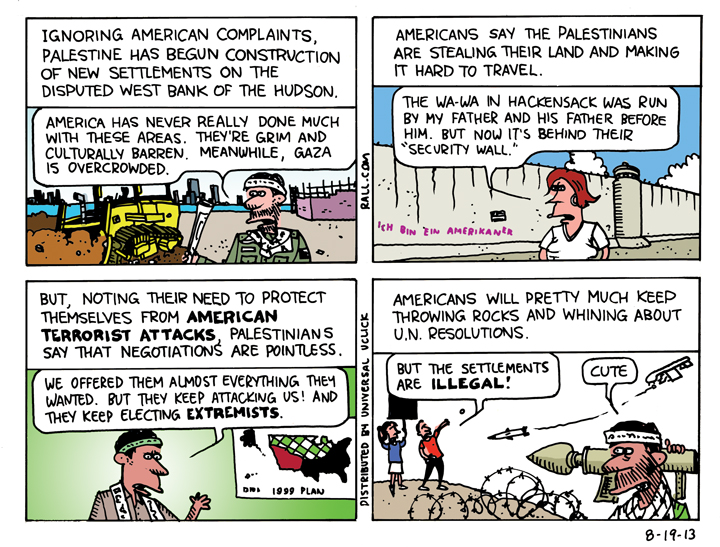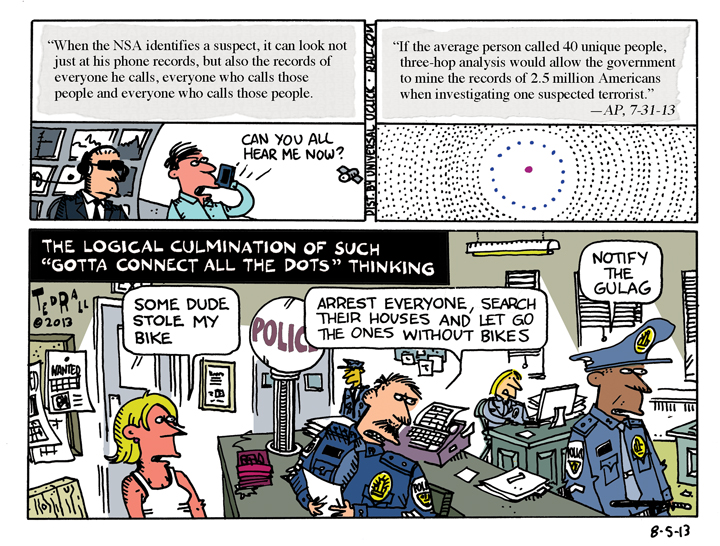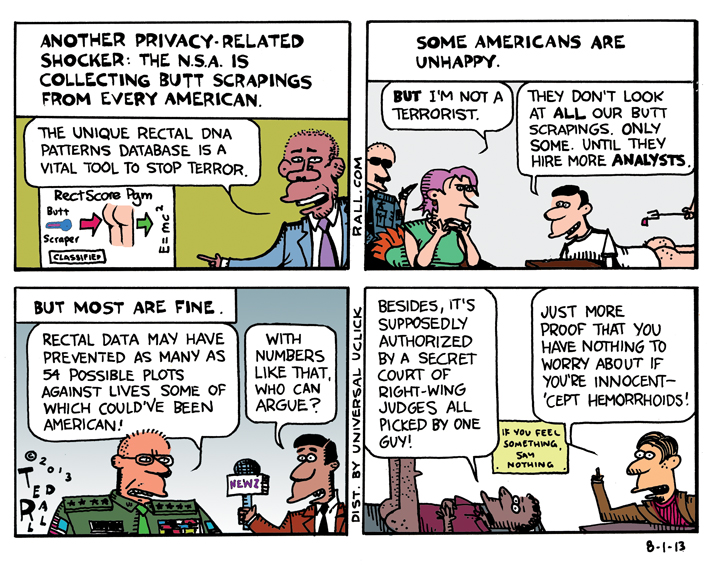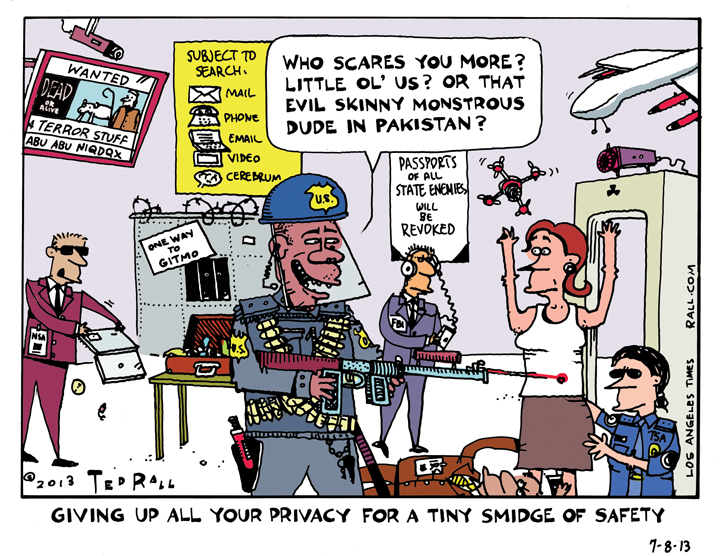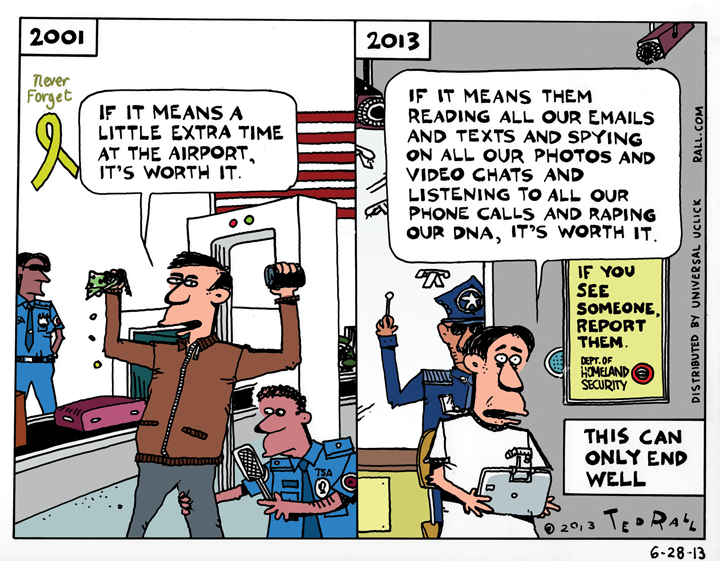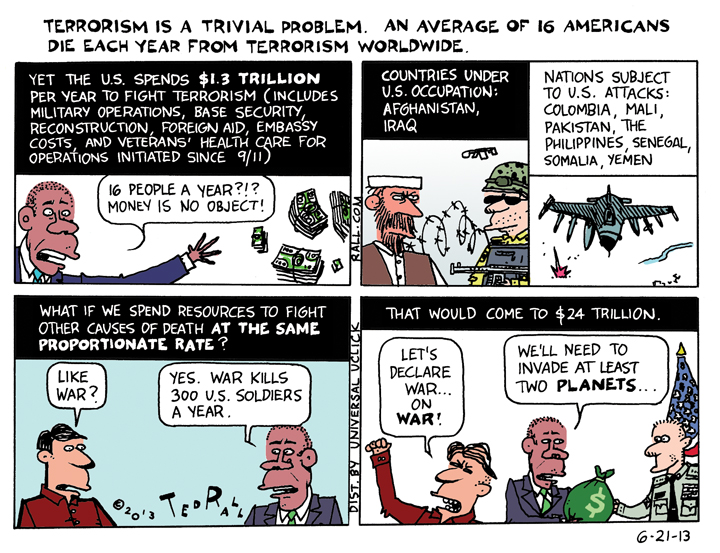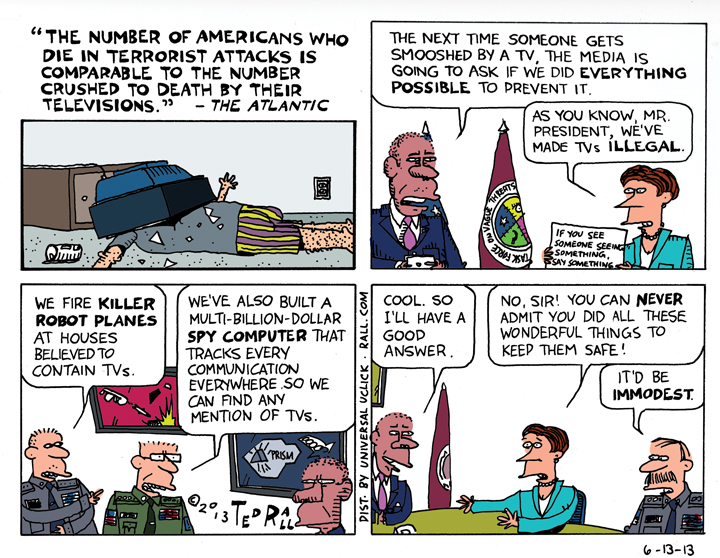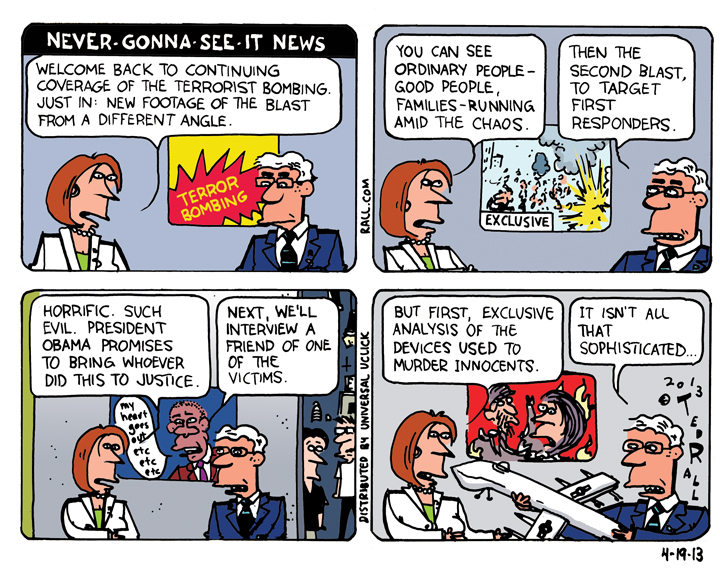Americans are complaining about illegal new Palestinian “settlements” on the West Bank of the Hudson River. But Palestinians point out that New Jersey is culturally undeveloped. Will throwing rocks help?
Nothing to Worry About
Another day, another revelation about another NSA program. This time it’s about how the NSA can search every e-mail in America.
War on War
What if we devoted a proportional number of financial and other resources to threats other than terrorism?
NOTE: My apologies to people who commented on this cartoon post. Due to a glitch in WordPress, I was forced to delete this post and put it back up. Regrettably, in the process, your comments were lost. I always make every effort to avoid this sort of thing, and I am sorry.
SYNDICATED COLUMN: The Real Reason to Impeach Obama
Why Is the FBI Helping a Monstrous Dictator?
Forget the IRS, AP and Benghazi. The real scandal this week — the corrupt politicization of the nation’s top law enforcement agency — is President Obama’s decision to carry water for one of the world’s most evil dictators.
In a little-noticed move, Obama’s FBI has arrested Fazliddin Kurbanov, a 30-year-old Uzbekistani political dissident who, were this 1983, would be dubbed a “freedom fighter.”
Kurbanov faces the generic catchall charges used since 9/11 by the feds against low-level Islamists: conspiracy to provide material support to a foreign terrorist organization — in this case, the Islamic Movement of Uzbekistan (IMU) — and conspiracy to provide material support to (individual) terrorists. As usual, the “material support” charge doesn’t amount to much: the indictment alleges that he researched and made videos about how to make IEDs to use in Uzbekistan.
Major plot point: Kurbanov’s “terror plot” did not target the United States.
Nearly as important: the IMU is not at war with the U.S.
Originally based in rural Tajikistan and southern Kyrgyzstan, the IMU’s goal is to overthrow Uzbekistani President Islam Karimov, the most brutal of the dictators that have run the Central Asian republics since the collapse of the Soviet Union.
Karimov’s regime brooks no dissent: torture and murder of political opponents (and of businesspeople who refuse to pay bribes) is widespread. Officialdom is breathtakingly corrupt, sucking the oil- and gas-rich republic dry. Universally feared and reviled, Karimov is best known for boiling dissidents such as Mazafar Avazov and Khuzniddin Alimov to death (details and a gruesome photo of the 2002 boilings can be found in my book “Silk Road to Ruin: Is Central Asia the New Middle East?“), and for personally orchestrating the 2005 Andijon Massacre, in which at least 400 civilians were slaughtered by Uzbek security forces.
After Andijon, even the ethics-deficient Bush Administration decided that enough was enough, pulling U.S. forces out of Kashi-Khanabad airbase, which it had leased since 2001, and slashing military aid.
Which did nothing to rein in the tyrant. “The Uzbek constitution imposes a two-term limit, but Karimov was elected to a third term…His government engages in routine torture of citizens and has subjected dissenters to forced psychiatric treatment,” reports Parade magazine. All three of Karimov’s “opponents” in the 2007 election campaigned on his behalf.
Even by the cynical standards of international realpolitik, Karimov is radioactive — the kind of over-the-top despot Americans normally consider targets of “regime change” or at least trade sanctions. No civilized country should maintain diplomatic relations with Karimov, a tyrant whose abuses equal or exceed those of Saddam Hussein and Moammar Gaddafi.
“Radioactive” is an unfortunate choice of words, since Uzbekistan’s uranium mines (along with vast reserves of Caspian Sea natural gas, oil, and a pipeline and refinery network strategically linked to its petroleum-rich neighbors Kazakhstan and Turkmenistan) is part of the reason the United States is sucking up to him.
Rather than targeting Karimov with drones or cruise missiles, Obama has the butcher of Andijon on speed dial, reaching out in 2011 to ask the Uzbek leader for permission to ship war materiel through his benighted country into U.S.-occupied Afghanistan. In 2012, despite a Human Rights Watch report that found that life under Karimov had gotten worse since Andijon, Secretary of State Hillary Rodham Clinton and President Obama agreed to restore Karimov’s billion-dollar aid package.
Even in this economy, it seems, a billion bucks only goes so far. To further ingratiate the U.S. to Karimov, the White House has targeted the IMU. Bear in mind, the IMU has never attacked the U.S. Even though a U.S. airstrike killed an IMU founders in 2001, the group has never declared its intent to attack the U.S. Its beef is with Islam Karimov; its goal is to establish an Islamist state in Uzbekistan.
The IMU’s misfortune has been to fall on the wrong side of the “enemy of our friend is our enemy” equation. We’re in bed with Karimov and his fellow Central Asian dictators. Our icky prisoner-boiling pals hate the IMU.
No doubt, the IMU is a violent insurgent group. During one of its periodic summer offenses, the IMU kidnapped four American mountain climbers in early 2000 — an offense that prompted Bush to declare the group a State Department-designated terrorist organization. But the fact that the climbers were American appears to have been unrelated to their capture. IMU offensives also swept up Tajik and Kyrgyz civilians and soldiers, and four Japanese geologists. (Kyrgyz security forces claim to have disrupted a 2003 IMU plot to blow up the U.S. embassy in Bishkek, but such claims, often ploys to attract U.S. foreign aid, should be met with skepticism.)
Like many radical Muslim groups in Asia, some members of the IMU — a small cadre of fighters estimated to number between 300 and 500 men — trained in Al Qaeda camps in Afghanistan during Taliban rule. After the 2001 U.S. invasion they fled across the border into Pakistan’s Tribal Areas, where they established alliances with and fought alongside various Pashtun Islamist groups. IMU fighters have clashed with U.S. occupation forces in Waziristan and Afghanistan. But the IMU has shown no sign of bringing the fight to the U.S. IMU ideology is local and regional, limited to spreading Sharia-based governments first and foremost in Uzbekistan, and in countries like Pakistan if possible. No one — not even the FBI — alleges that the IMU plans to attack the U.S.
The U.S. government is at war with radical Islam. The question for Americans is: In a conflict between a monstrous dictator and a small group of would-be revolutionaries trying to overthrow him, should we take sides — especially the side of the dictator?
(Ted Rall’s website is tedrall.com. His book “After We Kill You, We Will Welcome You Back As Honored Guests: Unembedded in Afghanistan” will be released in November by Farrar, Straus & Giroux.)
COPYRIGHT 2013 TED RALL
SYNDICATED COLUMN: If We Learn Geography, the Terrorists Have Won
When You Ask “Why?,” Mean It.
Why?
Why would anybody want to kill innocent people?
That’s what Americans — led by the media reporters and pundits who set the agenda for discussion — ask after every terrorist attack, particularly those carried out by foreigners.
Our mystified national cluelessness begs the question. Why do people blow up our embassies, bomb our ships, fly planes into our buildings, (try to) blow up their shoes and their underwear? They do it (partly) because we can’t imagine why anyone would do such a thing.
Studies, particularly the ones the media trots out at times like these, point to a number of factors. Some of these may help trigger the kind of violent “self-radicalization” that initial reports indicate may have led Tamerlan and Dzhokhar Tsarnaev, Kyrgyzstani brothers of Chechen descent, to detonate a pair of bombs at the Boston Marathon last week.
Was it psychological alienation? “I don’t have a single American friend,” Tamerlan, 26, supposedly the instigator of the attack, said. A traumatic event, like a job loss or the break-up of a romantic relationship? Some studies find that some self-radicalized (as opposed to those who are recruited into an organization) terrorists are made after they suffer a disappointment that sets them off, causing a person with political rage to graduate to violent direct action. After the Fort Hood shooting, the Pentagon concluded that substance abuse, post-traumatic stress syndrome or brain injuries sustained in an IED blast could be triggers. Some even blame the involvement of Dzhokhar, 19 and suffering from multiple gunshot wounds, on reports that he was a pothead.
But hey, one could just as easily ask what drove state terrorist Barack Obama to murder thousands of innocent people with killer drones. Was the president sad after failing to win a second Nobel Prize? Did Michelle stop putting out? Did cocaine and/or marijuana scramble his right temporo-parietal junction, the part of the brain that controls the moral judgments of human beings? It’s pretty safe to say we’ll never be able to point to one, or two, or 17 discrete factors as the “causes” for the conscious choice to kill another person.
Like the drone war, the Boston Marathon bombings were a political act.
At this point, my best guess is that this was an attempt to strike back at the U.S. in its post-9/11 “great war of civilizations,” or Christian “crusade,” as George W. Bush called it. Authorities who questioned Dzhokhar in his hospital bed say that he and Tamerlan wanted to defend Islam from attack.
You can argue that the Tsarnaev brothers’ politics were wrong. That their tactics were counterproductive. That they were just “losers,” as their uncle called them. But we can’t understand why unless we dig into those politics.
Which is something that, 12 years after 9/11, the American media still refuses to do. Which increases the odds of future attacks.
Terrorism is not prima facie the act of a nut. Serial killers don’t detonate bombs. Terrorists don’t terrorize for fun.
“Terrorism [as opposed to state terrorism, like the drone wars] is the tool of the weak, used by disaffected groups or minorities to oppose the rule and (as they see it) the oppression of an established and militarily superior power,” Mark Nicholson wrote. “Because it is resistance on the cheap, terrorism often emerges out of civil society rather than state sponsorship, because oppressed civilian groups, lacking control over governmental machinery, can summon little or no regular military force able to confront their ‘oppressor’ in conventional military terms.”
We like terrorists. Some of them, anyway. During World War II German occupation forces characterized the leaders of the Warsaw ghetto uprising as “terrorists.” We view these doomed Jews, who fought to the death, as noble. The Afghan mujahedeen who struggled against the Soviets during the 1980s were terrorists to the USSR, “freedom fighters” to Ronald Reagan. The French Resistance assassinated public officials and robbed banks and bombed trains, and we love ’em for it. In movies like “Red Dawn,” we cheer the patriotic American “terrorists” who wage guerilla warfare against the invaders.
This, of course, is how radical Islamists see themselves: as heroic fighters in a resistance movement against a rapacious, cruel oppressor. (And if they prevail, that’s how history will read.) They’re not psychotic. They’re principled, willing to sacrifice everything for their cause.
Since 9/11 our leaders have repeatedly told us that “they” “hate our freedoms,” but of course this is nonsense. As Osama bin Laden remarked, if the Islamists resented liberal societies, if they wanted the world’s women all under burqas, Amsterdam would have been blown to bits. “We only killed Russians after they invaded Afghanistan and Chechnya, we only killed Europeans after they invaded Afghanistan and Iraq,” bin Laden wrote in 2004.
To ask why Tamerlan and Dzhokhar Tsarnaev did what they did (if indeed they did it), to research their political motivations with an open mind, without dismissing them as random (friendless, stoned, loser) crazies, does not legitimize their tactics.
Self-styled Islamist resistance organizations like Al Qaeda haven’t garnered widespread support because terrorism against civilians is counterproductive. As Ché Guevara wrote, “terrorism [is] a measure that is generally ineffective and indiscriminate in its results, since it often makes victims of innocent people and destroys a large number of lives that would be valuable to the revolution.”
However, as Ché continued, terrorism directed against government or military officials can be legitimate: “Terrorism should be considered a valuable tactic when it is used to put to death some noted leader of the oppressing forces well known for his cruelty, his efficiency in repression, or other quality that makes his elimination useful.” After 9/11, for example, even some Americans viewed the Pentagon as a legitimate military target. Conversely, arguments that the World Trade Center, as a hub of a “technocratic corps at the very heart of America’s global financial empire,” was an acceptable target, were rejected. The WTC victims enjoy an exalted sainthood in popular culture; grief over the Pentagon victims has always been relatively muted.
No would-be revolutionary who knows history would have targeted a civilian target like the Boston Marathon.
So, let’s agree that the brothers’ tactics sucked. That what they did was evil. But what of their political motivations?
One would have to be blind not to understand why Muslims are enraged at the U.S.: Gitmo, drones, propping up dictators, Palestine, Abu Ghraib, Afghanistan, Iraq, the list goes on and on…and yes, Chechnya — where the Russians slaughtered thousands of innocents while their American allies silently cheered them on.
But few of us know about that. Because our media didn’t report it.
Which gets us back to:
Why’d the Boston bombers do it?
To get us to pay attention.
So we’ll force “our” government to stop what they’re doing in Muslim countries.
But that’ll never happen until we know “we’re” doing.
(Ted Rall’s website is tedrall.com. His book “After We Kill You, We Will Welcome You Back As Honored Guests: Unembedded in Afghanistan” will be released in November by Farrar, Straus & Giroux.)
COPYRIGHT 2013 TED RALL

